How To Deal With A Bully Chicken
Inside: Learn how to deal with a bully chicken to keep peace in your chicken coop.
So you think you have a bully chicken? Learn how to determine if you have a bully hen or rooster and how to reform the bully and restore peace and harmony to the coop.
Normal Chicken Behavior vs. Bullying
First, let’s discuss the difference between normal chicken behavior and bullying. Chickens will peck on each other. That is a part of their nature. An older hen will often deliver a sharp peck to a younger hen to remind her who is the boss.
A quick peck here and there is nothing to worry about. It is part of establishing the pecking order of the flock.
And pecking order is a very real thing. But it is part of normal chicken behavior. This is how chickens establish their social hierarchy.
The pecking order determines how chickens interact with each other within the flock. The pecking order typically influences who gets the most to eat, who gets the best nest box, and who gets the top roost post.
The order depends on many things within the flock. Age, breed, and personality all play a role in who is the head chicken.
The hen highest on the pecking order typically is an older, more aggressive hen. To be the top chicken in the flock, most hens have had to challenge other hens to get there. (And if you have more than one flock of chickens, they each will have their own hierarchy.)
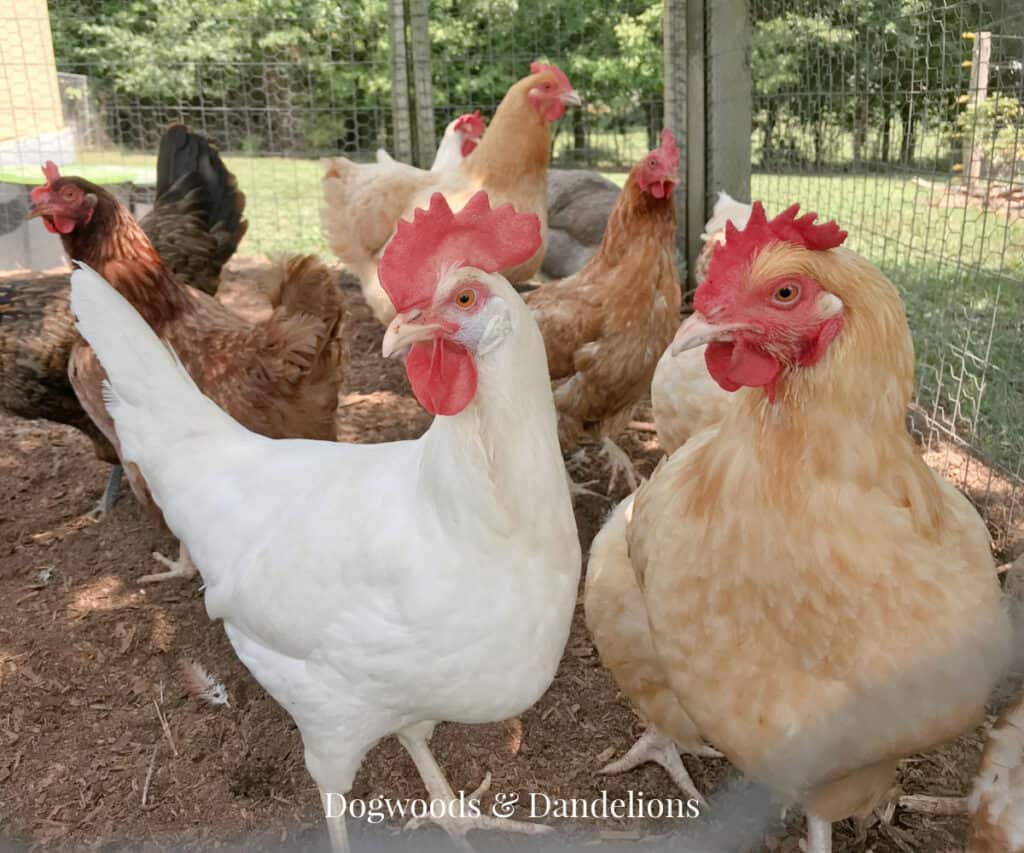
It is important to know the difference between normal behavior and bullying. Bullying is sustained mean behavior by one or more flock members.
Bullying behavior in chickens means a chicken is constantly being attacked or pecked by one or more flock members. And oftentimes, the bully is not the head chicken at the top of the pecking order.
The aggressive behavior is usually from a hen in the middle of the pack trying to show dominance to others. And they typically pick on weaker birds who are lower on the pecking order.
This is different than a chicken fighting to become higher on the pecking order. When a chicken is trying to move up in the pecking order, she will be fighting with members higher on the social ladder.
Affiliate Disclosure: Please note that some of the links in this article may be affiliate links and I may receive a small commission if you purchase something through a link. It will not change your cost. As an Amazon Associate, I earn from qualifying purchases. For more information, see my disclosures page.)
What Causes A Chicken To Become A Bully
There are many factors that can lead a chicken to become a bully. And determining the cause can help you figure out the best way to solve the problem.
Overcrowding
Overcrowding in the coop or run is probably the most common cause of a chicken becoming a bully. When chickens live in too close quarters, they don’t have enough room to explore. And the flock members lower on the pecking order don’t have a safe place to go to escape the bully.
Many times, the problem becomes even more evident in the winter when the chickens aren’t allowed out or choose to spend more time “cooped up” inside. Just like humans, they get on each other’s nerves after a while.
Boredom
Boredom is another common cause of bullying in the coop. When chickens don’t have enough to do, they will entertain themselves at the expense of other flock members.
This is another problem that tends to be more common in the winter months when the flock is more confined. Plus, even if your flock does free range, there are fewer bugs and grass to peck at and discover, so the chickens have less to do.
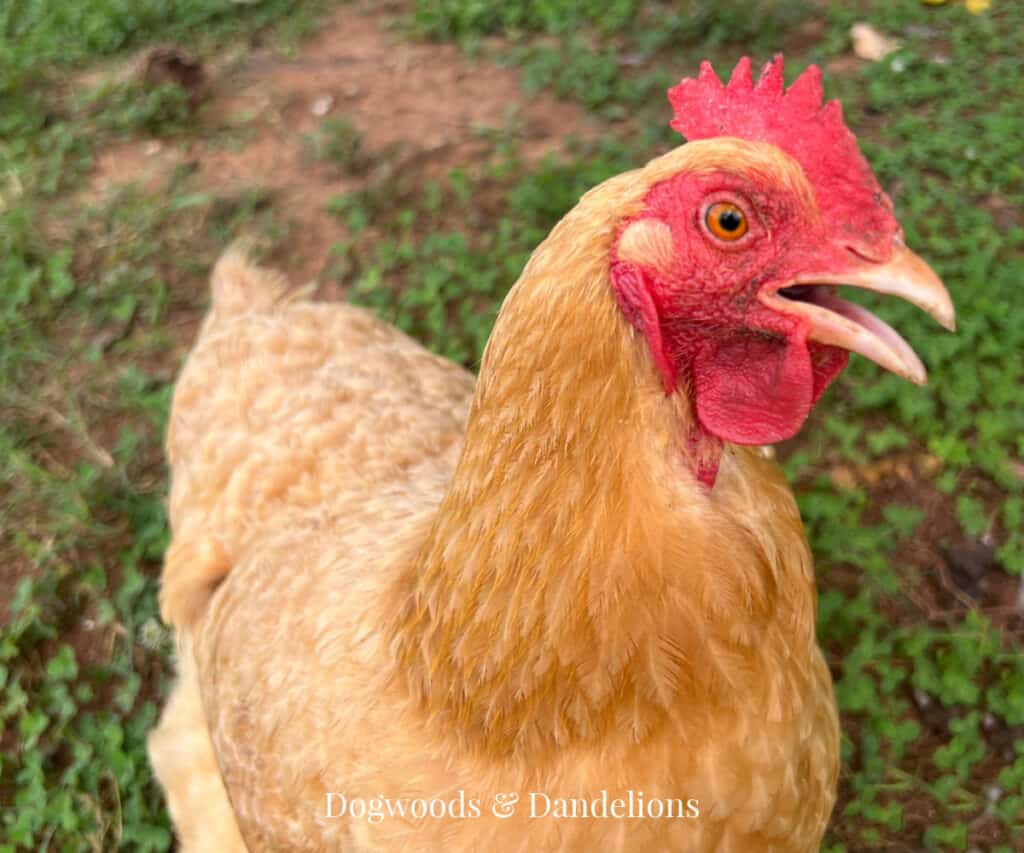
Stress
Stress can also cause a chicken to decide to bully other hens. And there are many factors that can cause stress. A change in routine, the death of a flock mate, predators around the coop, or even a change in feed can result in extra stress on the hens.
And just like humans, stressed chickens tend to act out.
Sickness
If lots of members of the flock are ganging up on one chicken, it’s possible that the chicken being bullied is sick. A sick chicken will try to hide an illness for as long as possible but many times the flock can sense it anyway.
Before chickens were domesticated a sick chicken would have been pushed out of the flock or even killed because the flock is only as strong as its weakest member.
And while our chickens no longer live in the wild, they still retain many of these behaviors. So the natural instinct of the chickens is to drive out the weaker members.
Calcium Deficiency
If you notice a chicken is just plucking other chickens’ feathers and then eating them, your chicken may have a calcium deficiency. It takes a lot of calcium to lay eggs, so be sure to supplement your laying hens with oyster shell to ensure their shells remain thick.
Read: What To Do For Soft Shelled Eggs to learn how to prevent calcium deficiency in your laying hens.
How To Deal With A Bully Chicken
If you determine that you have a bully chicken in your flock and you don’t have any serious injuries, review the reasons above to see if it’s possible for you to determine what might have caused a hen to start bullying other flock members.
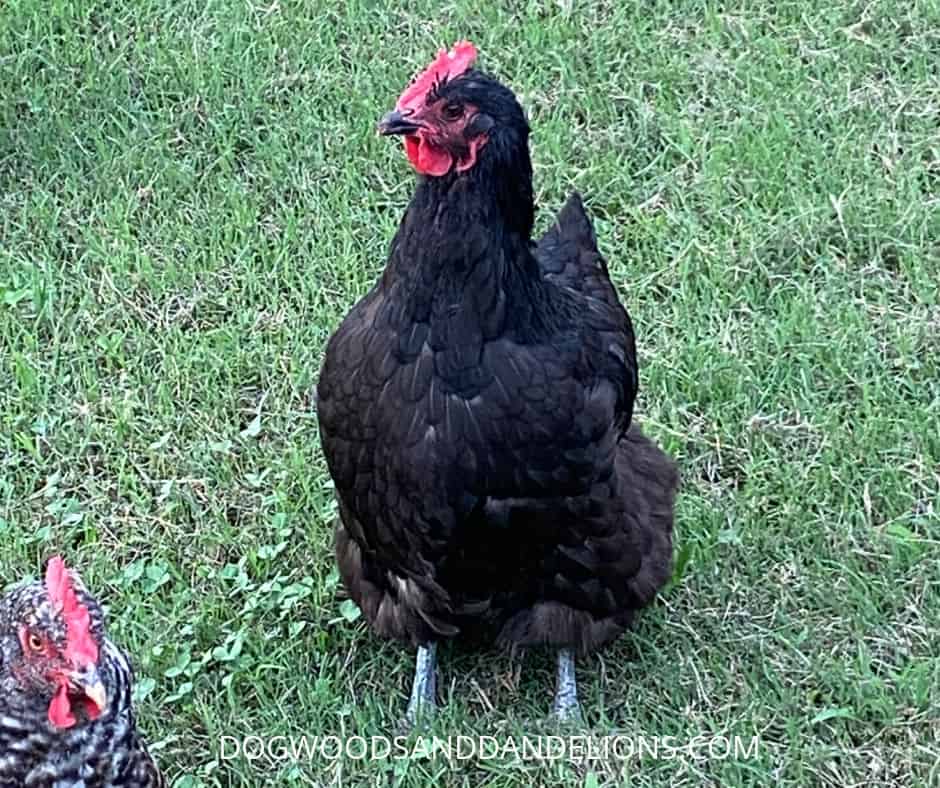
If overcrowding is the problem, try to give your chickens more space. Add a few extra roost posts to the inside of the coop. Allow your chickens to free range some if you feel comfortable doing so.
If you think your chickens are bored, boredom busters are a great way to stop some of the bad behavior in your flock.
Hanging a cabbage or other vegetables in the coop every few days can encourage your flock to peck at the vegetables instead of each other. These hanging vegetable feeders make it easy to add some healthy produce to entertain your hens. Occasionally add some mealworm blocks for the chickens to peck at.
I have even seen chicken swings used to keep a flock of chickens from getting bored. If that’s not your style, at least add some interesting rocks and logs to the run for the chickens to climb on and inspect.
Throw in some twigs or old garden debris for the chickens to investigate. Activities, where the chickens can peck at other interesting things, will give them something to do instead of being mean to their flock mates.
Think about whether your chickens have had any new stressors lately. If you have changed their feed, changed your routine, or there has been a death in the flock, there may be nothing that can be done. But if you notice predators roaming about, be sure your chickens are locked up securely at night so they feel safe.
And if you think a chicken might be sick, by all means, check the hen out and see what can be done for her. If you notice lots of chickens picking on one particular hen, sickness could likely be the cause.
How To Stop A Chicken From Bullying Others
If you have one aggressive bird and the chicken isn’t inflicting any damage other than an occasional peck, just monitor the situation. Give them some things to do and maybe even add a few places for the bullied chicken to hide. (Be sure to check these hiding places for eggs as the bullied chicken may decide to start laying her eggs there.)
If the situation seems a bit worse and you have the time, grab a water gun or spray bottle with a stream of water and spend some time with your chickens.
Anytime you see the bully attempting to harass other flock members, spray the bully with a stream of water. I have successfully used this method quite a few times to reform a bully chicken.
If You Have An Injured Chicken
If the situation is bad, and the bully won’t leave one or more hens alone, it’s time to take more serious action. The one thing you don’t want to do is to remove the bullied chicken unless she is injured. She will only be worse off when you return her to the flock.
Instead, remove the bully! Take the bully out of the flock and keep her separate for at least a week in isolation. Don’t allow her to see or interact with the other flock members.
After a week or so, you can try returning her to the flock. By this time the other members have most likely forgotten about her so she will be back at the bottom of the pecking order.
As low chicken on the totem pole, she really won’t have anyone to bully. And she will have to fight her way back up to her position.
Most of the time, she will decide it’s not worth the hassle. This method has always worked for me.
However, you occasionally will get a chicken that will try to regain her position. Again, watch closely. But remember, the pecking order is real and there will be some minor pecking and fighting as the chickens jockey for positions.
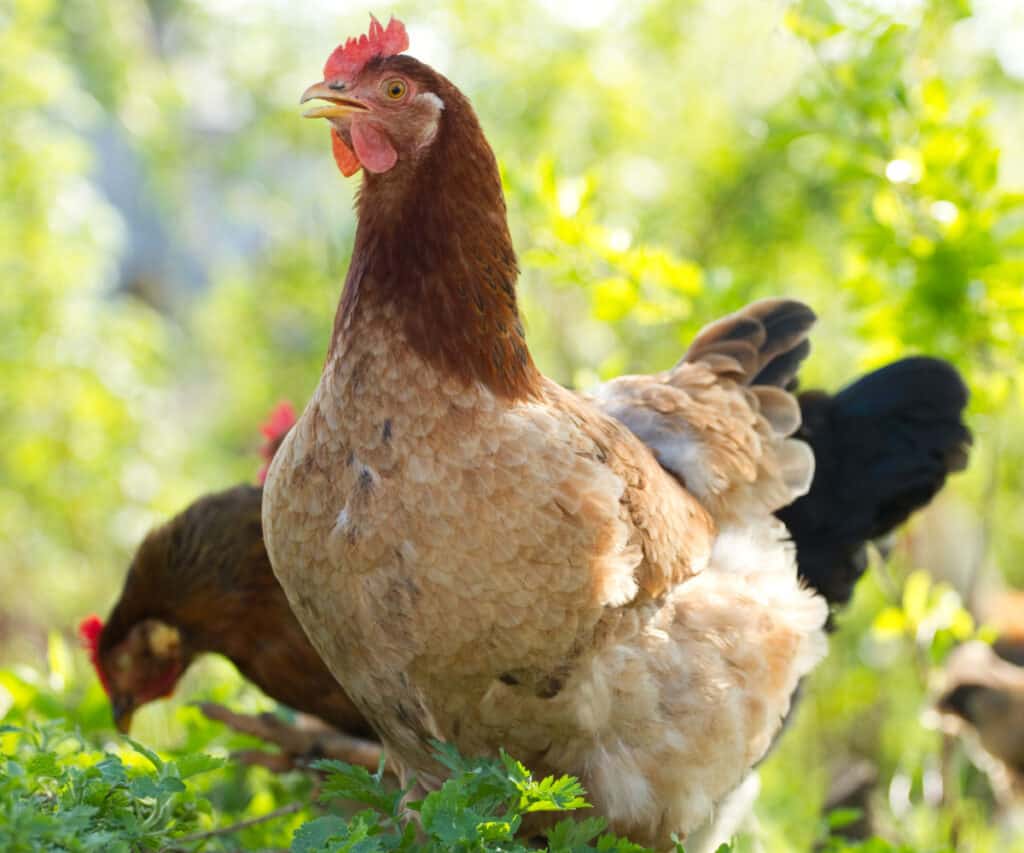
What To Do For An Injured Chicken
If you do have a chicken that is injured, you have no choice but to remove her from the flock. Otherwise, the hens may kill her.
If you see blood, you must immediately remove the hen and treat her injuries. However, if possible, keep the injured hen where she can see her flock mates. This way they won’t forget her.
If they do forget who she is, she will start all over at the bottom of the pecking order and is likely to get picked on and bullied again. So only remove the bullied hen as a last resort.
How To Prevent Chickens From Being Bullied
While you can’t always prevent a chicken from being bullied, there are some things you can do to make bullying less likely.
First, provide plenty of space for your hens. At a minimum, provide 4 feet of space per chicken in the coop and 8 feet per chicken in the run. However, the more space, the better.
Secondly, provide at least 2 feeders and 2 waterers some distance apart. This makes it much harder for one chicken to keep others from eating and drinking.
Some people have had good luck using a light with a red bulb. This makes it more difficult for chickens to peck at red combs and wattles.
However, I am always hesitant to use any kind of light bulbs in my coop as they are a major fire hazard. But I did find red rope lights on Amazon which should work well, provided they are installed out of the reach of the chickens. (I use regular rope lights to light my coop in the winter.)
Read more: Should I Light My Chicken Coop In The Winter?
If you are trying to add new chickens to an established flock, there will be some fighting and pecking. Both groups have their own pecking order so a whole new social order has to be established among the entire flock.
You will need to keep a close eye on your flock to ensure nothing gets out of hand. Most of the time the new birds will be the ones that get picked on.
It is a good idea to provide at least two feeders and two water stations when combining flocks so the new members can get enough food and water without the dominant birds hogging the feeder.
I have an entire post on combining two flocks of backyard chickens that explains my method of blocking off a separate pen in the chicken yard or coop until the rest of the flock is used to the new flock members.
What If My Rooster Is The Bully?
Occasionally, you will have an aggressive rooster that is a bully to the hens. First, determine if your rooster is actually being mean to one of your hens or is just mating with her too frequently.
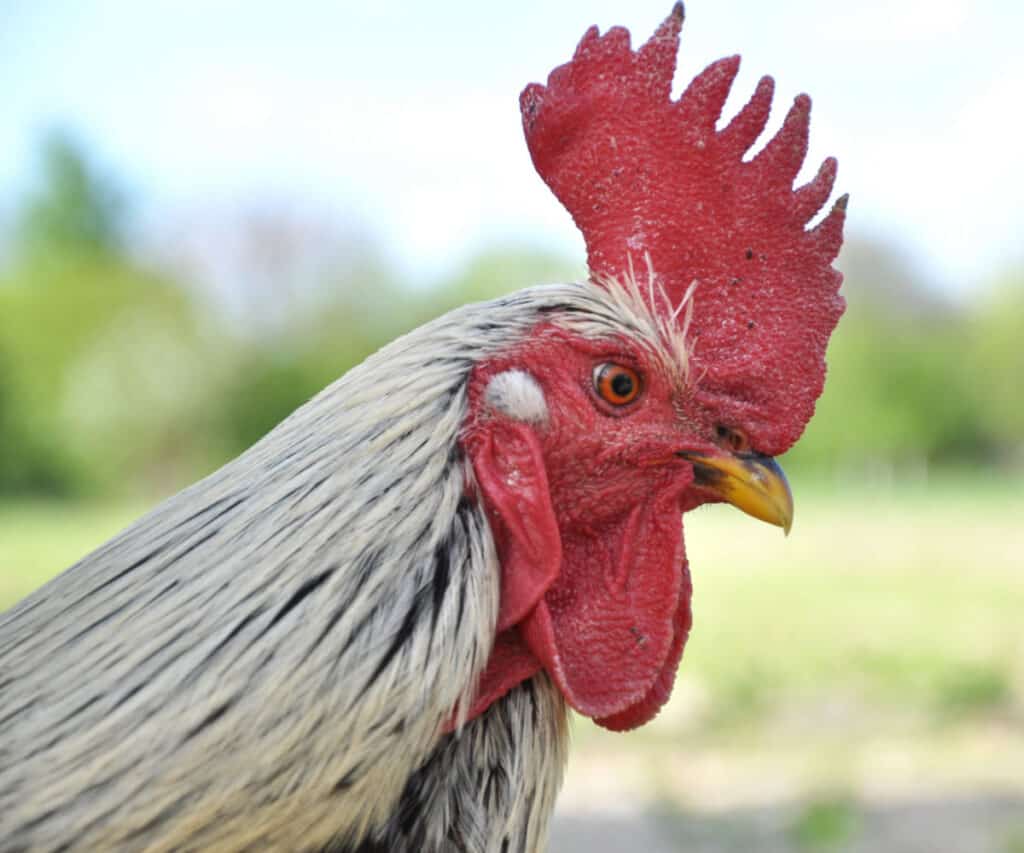
If the hen has feathers worn off her back, she is probably the favorite of your rooster. You may want to purchase a chicken saddle to protect her feathers. These fit over a hen’s wings to keep the rooster from pulling out her feathers when he is mating.
If the rooster is really being mean to the hens, it’s time to remove him and try the isolation tricks above.
If you have more than one rooster, it’s possible that you don’t have enough hens for each rooster to have his share. There should be at least 4 hens per rooster in your flock.
And if you introduce a new rooster to a flock with an existing rooster, there will almost certainly be fighting and probably bloodshed. Many times the roosters will fight until one dies.
So while there will most likely be times of unrest in the chicken coop as members shuffle the pecking order, the majority of the time, you shouldn’t notice too much fighting and bullying. Most of the time, peace and harmony will reign in your backyard flock.
Have you ever had a bully chicken? What did you do to handle the situation?
Related Posts
- Should you free range your chickens? This post will help you decide.
- Combining two flocks of chickens? Learn how to do it with minimal bloodshed.
- Learn ways to help your molting chickens.


Meet Julie
I’m a farm girl born and bred in North Carolina. I’ve been growing a vegetable garden for over 20 years (and helping my Mom grow hers even longer). I’ve been raising chickens in my bathtub and backyard for 12+ years. I believe that homegrown food can be made simple. Let’s get started.
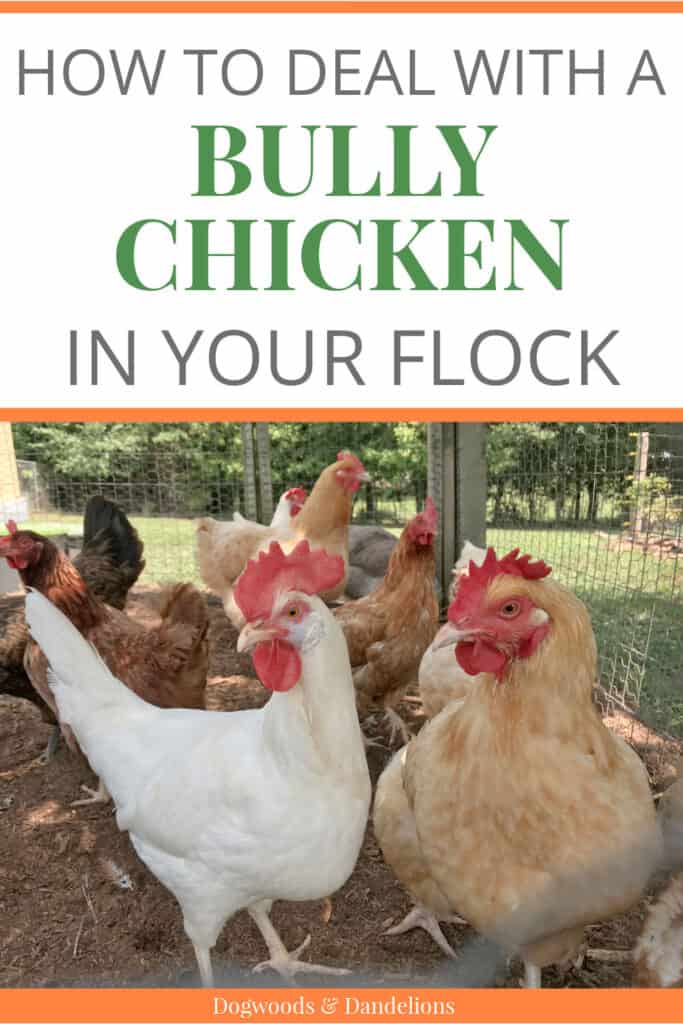


We had one and one day my son told he couldn’t play outside and so that was the day we gave him to our neighbor. Our neighbor either ate the a rooster or his dogs did. We never saw the a rooster again and my son was able to play outside. I did not intend for the rooster to die.
A friend had a few hens that were getting picked on and she gave them to me and in my flock after being introduced, they were welcomed and happy.
Roosters can sometimes be so mean, not only to other chickens but to humans as well. I’m so glad your new hens are getting along with the rest of your flock.
I had 9-10 hens 25 yrs ago when we lived in a more rural area and in the spring, when one of the hens started molting, the head honcho started pecking at her and wouldn’t let her eat or drink, even though I fed and watered them in opposite corners of the pen! The molter got to scared she hid in between the nesting boxes so I kept her out of the pen for a week until her feathers started growing back. Then I let everyone out while I cleaned the pen and everything was fine! If there is a next time, I’ll take the mean girl out instead 😄.
Thank you for sharing your story. It sounds like it all worked out for you though so that is great!
I had a rooster who was severely bullying one of my hens, so I rehomed him.
Now, she is the bully, and has injured another hen! I’m beginning to think the rooster was bullying her because she was too dominant, or even that he could tell something is wrong with her in the head.
I’m gonna try this method with her.
I hope this works for you. As you just found out, chickens can sure be mean sometimes!